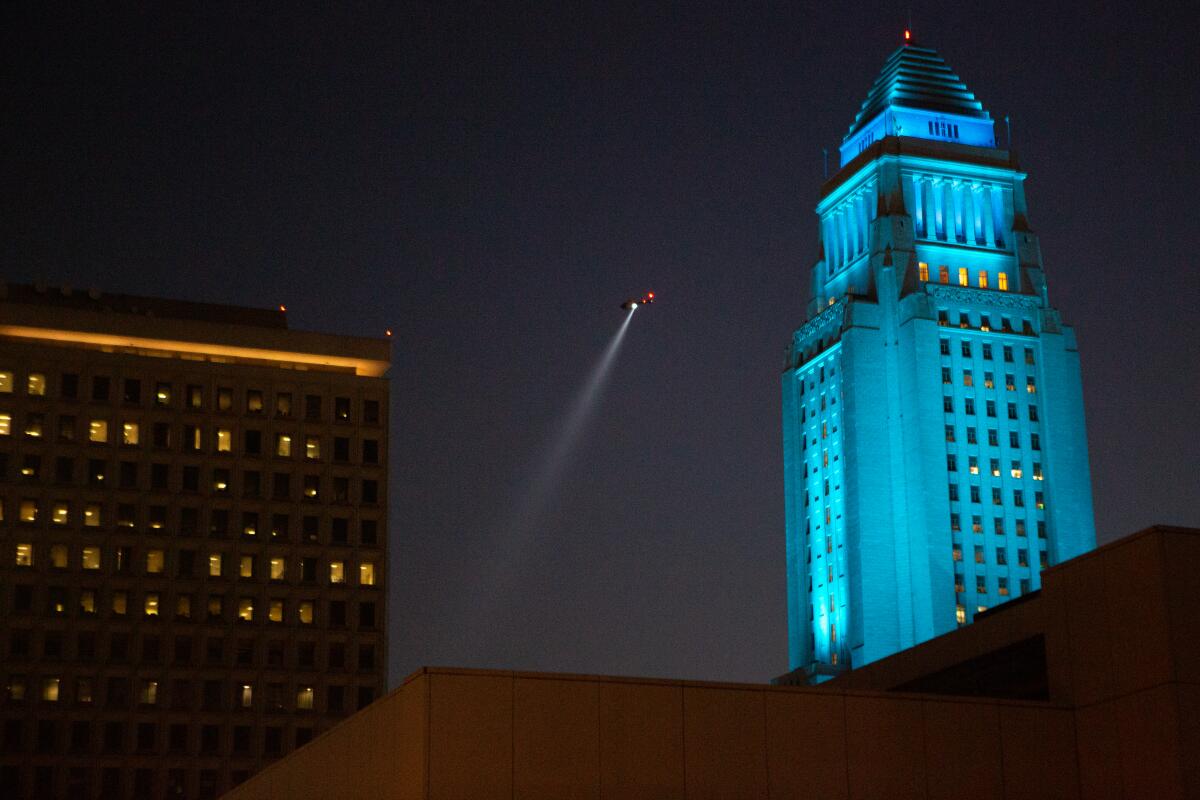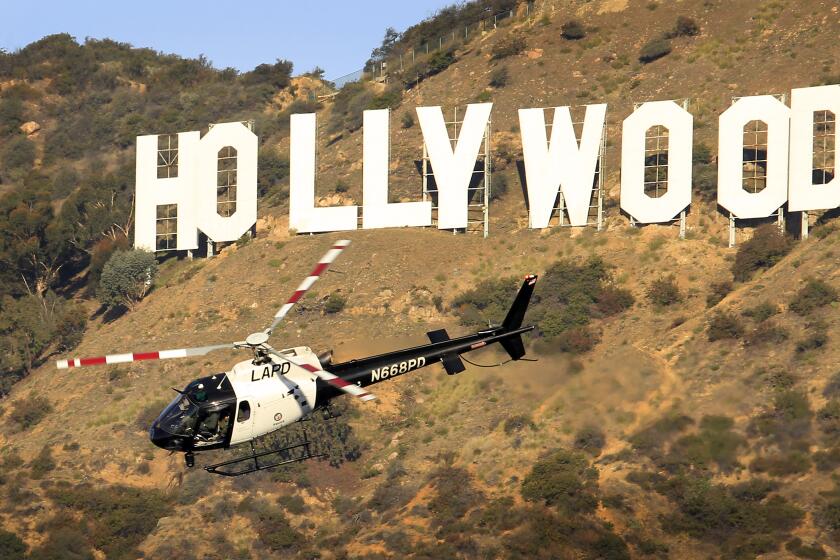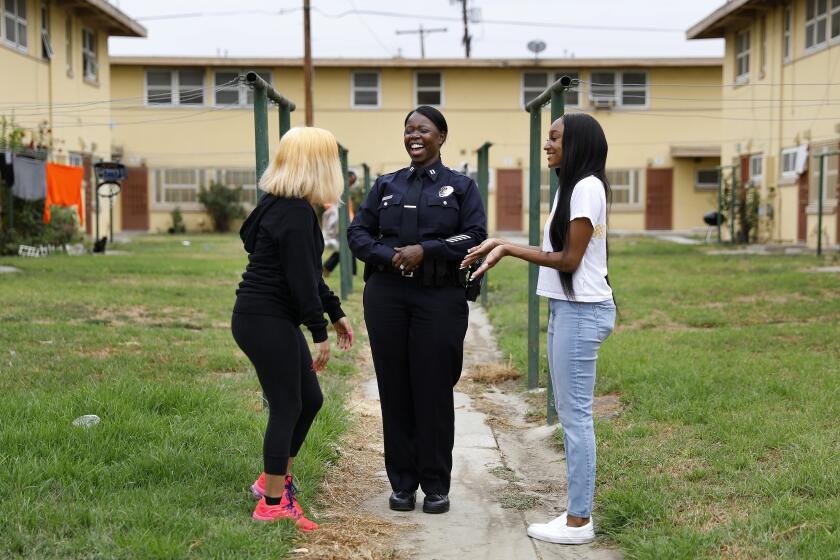LAPD slams ‘highly inaccurate’ audit that questioned millions spent on helicopters

- Share via
Two months after an audit raised questions about the cost and value of the Los Angeles Police Department’s helicopter program, the department has shot back, defending its nearly round-the-clock flights above the city.
In a presentation to the L.A. Police Commission on Tuesday, LAPD Cmdr. Shannon Paulson said that the audit showed a “fundamental lack of understanding” about how the aircraft help identify and catch crime suspects.
The audit by the city controller’s office reported that 61% of flight time by LAPD helicopters was spent on “non-high priority incidents.” Paulson said that finding was based on a “highly inaccurate definition” of so-called Part I crimes set by the FBI, which include homicides, robberies and property crimes such as auto theft.
The audit ignored the fact that with a home burglary or overnight car theft, the department is “unlikely to provoke a response [from a helicopter] due to the fact that the crime is stale,” Paulson said. She noted that helicopters are often dispatched to disrupt street racing or sideshows, which are not considered Part I offenses.
L.A. City Controller Kenneth Mejia released the results of a months-long review of the Air Support Division, questioning ‘whether the LAPD has justified the need for the program’s current size and scope.’
Paulson, who is second-in-command at the LAPD’s Counter-Terrorism and Special Operations Bureau, said the controller’s report also relied on “inflated” statistics related to fuel costs and burn rates, overstating the cost and environmental impact. LAPD officials also questioned the study’s methodology.
The audit, released in December by L.A. City Controller Kenneth Mejia’s office, scrutinized the millions of dollars the department spends annually to maintain its aerial fleet, said to be the largest of any municipal department in the country.
Sergio Perez, chief of accountability and oversight for the controller’s office, said Wednesday that the office stood by its findings. He told The Times that the LAPD failed to “provide meaningful feedback and refused to sit down for exit meetings” with the report’s authors, and also withheld certain data that it published only in its own report.
Perez questioned the scientific rigor of an internal study by any organization “interested in defending its marquee programs.”
“This seems to be an example of an agency that found itself very unhappy with the recommendations and conclusions of an independent, objective, outside audit and now it’s trying to turn the clock back and say that the information that we included was not accurate,” Perez said.
Another contested portion of the audit dealt with the use of LAPD helicopters for non-law enforcement functions, such as air shows and flights to promote the LAPD or raise money for police-related causes. Such uses came under scrutiny by department officials in 2014 after a police chopper dropped scores of golf balls onto a golf course as part of a fundraiser. The department also recently reviewed whether its helicopters were creating confusion by flying too low over crime scenes.
LAPD officials said the helicopters used in ceremonial roles were already in the air for other purposes and would have been diverted if a serious emergency had occurred.
Los Angeles police are investigating suspects who allegedly swiped millions of dollars worth of sneakers in an elaborate scheme that stretched from a Nike distribution hub in Tennessee to a swanky Hollywood apartment building.
Beyond the audit, UCLA researchers spent months studying helicopters’ health effects in Black and Latino neighborhoods by using highly sensitive instruments to measure noise pollution from low-altitude flights. Residents and some academics have said that the disruptive noise caused by helicopters circling overhead can cause serious health consequences, including poor sleep and anxiety. The controller’s office also released a heat-map tool that would enable users to look up the costs and pollution associated with helicopters flying over their neighborhoods.
The LAPD released data showing that the amount of time helicopters spent in certain areas was proportionate with the amount of violent crime and gun violence there.
Helicopters also allow law enforcement to more safely track suspects during high-speed pursuits, officials said, dramatically reducing the number of collisions from such chases. Some of the units are equipped with a thermal camera system that can pick up the heat signatures of suspects who are attempting to hide.
In recent weeks, helicopters have been used to monitor protests of a visit by President Biden, to track members of a burglary ring and to locate a missing hiker, officials said Tuesday, while also noting an incident in which an airship used its powerful “Nightsun” spotlight to illuminate hilly terrain near Santa Monica. And yet, officials said, such context was left out the controller’s report.
“The question is how do you put a price on saving a life,” Assistant Chief Blake Chow told the commission.
The two reports did agree on the need for better data collection about helicopter flights.
LAPD Chief Michel Moore said that the department’s helicopters have been used to safeguard his home after his family received threats, saying their “presence is a blanket of security.”
For all the gains women in the LAPD have made in recent decades, they remain underrepresented in the upper reaches of the department.
He and other department officials found a sympathetic audience in the commission, whose members seemed to second-guess the city controller’s study.
“How do we work with them to prevent something like this to happen in the future?” Commissioner Fabian Garcia asked.
Commission President Erroll Southers said he found it “very concerning” that the controller had cited no study that found a conclusive link that the helicopters pose a “health risk to the public.”
Much like other law enforcement technology, the LAPD’s reliance on helicopters has drawn greater interest since the 2020 police murder of George Floyd in Minneapolis and the social justice reckoning that followed. Mejia, the city controller, ran on the promise of closely scrutinizing police spending, which has often put him at odds with the powerful Los Angeles Police Protective League, the union that represents the city’s rank-and-file officers.
Dinah Manning, Mejia’s director of public safety, said in an interview Wednesday that it seemed the LAPD was trying to discredit the audit’s findings by suggesting it was politically motivated.
“The civil service staff, the auditors who worked on this audit are folks who were here before Kenneth Mejia, are folks who will be here after Kenneth Mejia,” she said.
More to Read
Sign up for Essential California
The most important California stories and recommendations in your inbox every morning.
You may occasionally receive promotional content from the Los Angeles Times.














